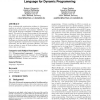Free Online Productivity Tools
i2Speak
i2Symbol
i2OCR
iTex2Img
iWeb2Print
iWeb2Shot
i2Type
iPdf2Split
iPdf2Merge
i2Bopomofo
i2Arabic
i2Style
i2Image
i2PDF
iLatex2Rtf
Sci2ools
135
click to vote
SAC
2006
ACM
2006
ACM
Challenges in the compilation of a domain specific language for dynamic programming
Many combinatorial optimization problems in biosequence analysis are solved via dynamic programming. To increase programming productivity and program reliability, a domain specific language embedded in Haskell has been suggested. We point out several shortcomings of this approach, and report on some challenges in the (ongoing) project of migrating this domain specific language from its host language to a directly compiled implementation. Most of these challenges are domain specific optimizations, which not only improve significant constant factors of runtime and space requirements, but also affect asymptotic efficiency. We report on our solutions to some of these problems, and point out others that are still open. Categories and Subject Descriptors D.3.2 [Programming Languages]: Language Classifications--Specialized application languages; D.3.4 [Programming Languages]: Processors--Compilers; J.3 [Life and Medical Sciences]: Biology and genetics General Terms Languages, Algorithms Keyw...
Applied Computing | Biosequence Analysis | Domain Specific Languages | Dynamic Programming | SAC 2006 |
Related Content
| Added | 15 Dec 2010 |
| Updated | 15 Dec 2010 |
| Type | Journal |
| Year | 2006 |
| Where | SAC |
| Authors | Robert Giegerich, Peter Steffen |
Comments (0)

